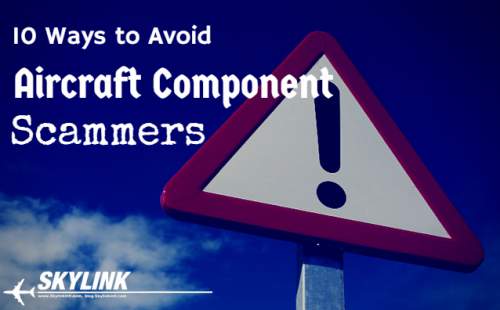10 Ways to Avoid Aircraft Component Scammers
We’ve all been there. You purchase an aircraft component and never receive it. You've been scammed. Or you receive something that’s vastly different than what you ordered. 
In either case you've been duped, tricked, and fooled into paying for something that was a lie.
Money is thrown in the garbage and you’re left having to fix it.
You think you’re alone when this happens. Sadly, you're not alone.
A few years ago we bought an INU for $15,000. The "company" was based out Atlanta. GA.
Before paying we revised the airworthiness certa. Everything checked out. The vendor sent us an AWB.
The next day, nothing showed up and nothing tracked. We called the local FedEx branch and they said they have a guy on video coming back to pick up the part.
We were officially scammed.
Thankfully for me I have a cousin in the FBI and a few friends gave these scammers a nice phone call. Over the next couple weeks we had our check back.
We can't all be so lucky every time.
We’ve also encountered a $30,000 fraudulent wheel assembly purchase out of Turkey. We avoided it using the tips below.
Smell the scammer
[Tweet "If it looks like a scammer and it smells like a scammer then it is a scammer. #avgeek"]
During your first communications you’ll have clear signs of what type of person you’re dealing with. He probably even smells funny through the phone. If you smell a stench, hit the trench.
Reliable partners are completely transparent. You can find them online, they’ll video chat with you and they’ll reply to you during all hours of the day.
Scammers want to keep a low profile and they ALWAYS use aliases. It’s your responsibility to connect the dots. If the dots are easier to connect, you have a legit company.
Disclaimer: just because they’re legit doesn’t make them good. Legit companies can still be horrible to work with.
Ways to avoid being tricked
We’ve been tricked into buying fraudulent aircraft parts numerous times. It's tough to spot especially if you're in a rush.
We’ve also received parts that weren’t what we ordered and getting it resolved was a pain.
Here is a list to help you avoid be scammed. If you’re dealing with someone that resembles these be cautious.
- They don’t have a professional website.
- They have a standard email address like @gmail or @hotmail.
- They don’t give you their phone number, better yet they hide their mobile #.
- They write emails unprofessionally.
- You request documents and it takes then a couple days to get them to you.
- You request a picture of the unit but all you get is one picture fuzzy looking thing.
- You request a picture of the id plate and the S/N doesn’t match their paperwork.
- You ask if they take credit card and all they take is wire transfer.
- You ask them to fill out your QA audit form and they don’t have an internal QA policy and they can’t send you a copy of their QA manual.
- You can’t find the person you’re purchasing from on the internet.
These are the best ways to spot a scammer. Professional aircraft component scammers have to keep running. They lurk in the shadows.
When talking with them something will always be suspicious. Keep ears and eyes open.
Better yet, if they resemble some of these points above, run away.